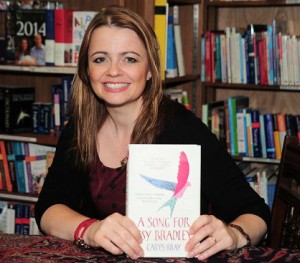Blog
Thievery: A Song for Issy Bradley
 24th Jul 2014 in Guest Post, Thievery
24th Jul 2014 in Guest Post, Thievery
 On Thursdays, I invite my favourite writers to share the inspirations behind their stories. Here’s one from the brave and beautiful Carys Bray.
On Thursdays, I invite my favourite writers to share the inspirations behind their stories. Here’s one from the brave and beautiful Carys Bray.
The Story:
‘Scaling Never’ was published in Dialogue.
An Extract:
Before Issy died Mum used to read a fairy tale each night from the old, fat, book that she had been given as a present when she was a little girl. Afterwards she would get the Bible and the Book of Mormon picture books out and read a story from one of them, too. Jacob’s favourite fairy tale used to be ‘The Wolf and the Seven Goats.’ The best bit was the part where the mother goat opened up the wolf and her kids tumbled out of his big furry belly. ‘The Wolf and the Seven Goats’ is just made up. But the story of Jonah and the Whale is a real life miracle. Jonah got stuck in a whale and survived. In the Bible and the Book of Mormon there are even better stories than Jonah’s, stories about people who died and came back to life, like the story of Lazarus. Jacob remembers it because there’s a bit where Lazarus is so dead Martha says ‘he stinketh’ and after they read it, Mum occasionally said, ‘Who stinketh?’ when someone did a trump. There’s the story of Jairus’s daughter too. Everyone thought she was dead and people were crying but Jesus told Jairus to believe; and when they reached the house there’d been a miracle and the girl wasn’t dead any more, she was just sleeping. With God all things are possible – that’s what it says on Mum’s painting of a bird with its wings spread wide in flight on the kitchen wall. Miracles are like birds, they zip through the gap between heaven and earth on hollow-boned wings. You can’t catch them with traps or nets or special glue, you have to use words.
The Inspiration:
As a child I spent many hours in church meetings, listening to miraculous stories from the scriptures and everyday life. I loved these stories, they made the world a magical place and, for a long time, I accepted them as theoretically possible, even though such events remained outside of my own experience.
When my second child was born with a life-limiting condition I ended up in an intensive care unit surrounded by critically ill babies and I stopped believing in magic words and divine intervention. But I remained fascinated by miracle narratives. In particular, the significance that the tellers of such stories attach to the wellbeing and happiness of their family and friends, and the (largely unspoken) implication that if others were only more deserving, they too may have had cause to experience the miraculous.
‘Scaling Never’ started with an image of a boy kneeling in his back garden, digging up a dead bird. As I wrote the story I remembered what it was like to be a child, and I imagined seven year old Jacob Bradley, a boy who doesn’t just believe in miracles, he expects them. Jacob knows he can make everything better with a little faith and the right words and, drawing on all the wonderful, improbable stories he has ever heard, he sets out to engineer a very important miracle.
After the short story was published it grew into my novel, A Song for Issy Bradley. And as the novel developed, other voices crept in; a mother, a father and a couple of teenage siblings, all struggling to come to terms with a tremendous loss. The miracle Jacob attempts to engineer doesn’t happen – it can’t – but a series of small coincidences ultimately lead Jacob and his family back to each other. Whether these coincidences are miraculous is a matter for the reader to decide. As for me, I don’t believe in miracles, but I do believe in people, and I believe that sometimes, in extraordinary circumstances, incredible things are possible.
—
Read ‘Scaling Never’ in Dialogue. A Song for Issy Bradley is out now from Hutchinson.
